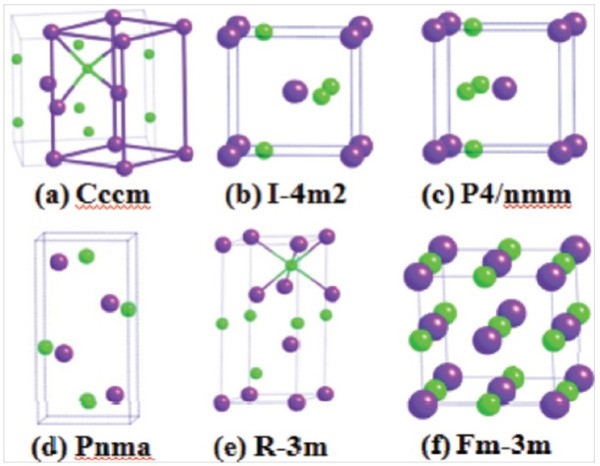THEORETICAL STUDY OF THE GROUND-STATE STRUCTURES AND PROPERTIES OF NIOBIUM HYDRIDES UNDER PRESSURE
As part of a search for enhanced superconductivity, we explore theoretically the ground-state structures and properties of some hydrides of niobium over a range of pressures and particularly those with significant hydrogen content.

A primary motivation originates with the observation that under normal conditions niobium is the element with the highest superconducting transition temperature (Tc), and moreover some of its compounds are metals again with very high Tc’s. Accordingly, combinations of niobium with hydrogen, with its high dynamic energy scale, are also of considerable interest. This is reinforced further by the suggestion that close to its insulator-metal transition, hydrogen may be induced to enter the metallic state somewhat prematurely by the addition of a relatively small concentration of a suitable transition metal. Here, the methods used correctly reproduce some ground-state structures of niobium hydrides at even higher concentrations of niobium. Interestingly, the particular stoichiometries represented by NbH4 and NbH6 are stabilized at fairly low pressures when proton zero-point energies are included. The structures found in the ground states of the high hydrides, many of them metallic, suggest that the coordination number of hydrogens around each niobium atom grows approximately as 4n in NbHn (n = 1–4), and is as high as 20 in NbH6. NbH4 is found to be a plausible candidate to become a superconductor at high pressure, with an estimated Tc ∼ 38 K at 300 GPa.
Guoying Gao1,2, Roald Hoffmann2, N. W. Ashcroft3, Hanyu Liu1, Aitor Bergara4,5,6, and Yanming Ma1
1State Key Laboratory of Superhard Materials, Jilin University, Changchun 130012, People’s Republic of China
2Department of Chemistry and Chemical Biology, Cornell University, Ithaca, New York, 14853, USA
3Laboratory of Atomic and Solid State Physics, Cornell University, Ithaca, New York, 14853, USA
4Materia Kondentsatuaren Fisika Saila, Zientzia eta Teknologia Fakultatea, Euskal Herriko Unibertsitatea (UPV/EHU), 644 Postakutxatila, 48080 Bilbo, Basque Country, Spain
5Donostia International Physics Center (DIPC), Paseo de Manuel Lardizabal, 20018, Donostia, Basque Country, Spain
6Centro de Fisica de Materiales CSIC-UPV/EHU, 1072 Posta kutxatila, E-20080 Donostia, Basque Country, Spain



